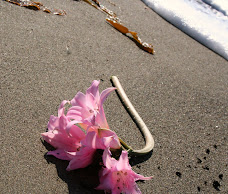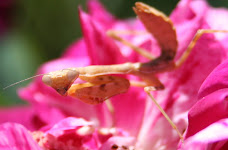Sepia Saturday
 My grandmother Cordelia and her new husband John in 1937
My grandmother Cordelia and her new husband John in 1937During the Great Depression, my father’s mother, Cordelia, had taken as much as she could of her marriage in Oklahoma. She talked it over with her best friend, Opal, and the pair of them, still in their twenties, set out to cross the Dust Bowl alone. She left behind her little son, my dad, in the care of his grandparents.
Their destination was the West Coast, where they had heard farm workers were wanted. Dee, as she was known, wasn’t a farm wife. She was a poor man’s wife on the outskirts of Tulsa. Her skills were canning, embroidery, basic quilting, and growing whatever kind of garden she could grow. But she and Opal figured they could do any work that was necessary to make a new life in the West. So they joined the migrant-worker camps.
They stayed together and worked together for quite a long while, following the various harvests. It was rough work, stooping for hours in fields while picking crops, climbing trees to pick fruit, making just enough money to move on.
Their destination was the West Coast, where they had heard farm workers were wanted. Dee, as she was known, wasn’t a farm wife. She was a poor man’s wife on the outskirts of Tulsa. Her skills were canning, embroidery, basic quilting, and growing whatever kind of garden she could grow. But she and Opal figured they could do any work that was necessary to make a new life in the West. So they joined the migrant-worker camps.
They stayed together and worked together for quite a long while, following the various harvests. It was rough work, stooping for hours in fields while picking crops, climbing trees to pick fruit, making just enough money to move on.
If shelter was provided, it was often a camp of dirt-floor jerry-rigged shacks without running water of any kind except what could be found in ditch or creek. Sometimes camps had barracks-like tents. Sometimes rent was charged for the crude shelters. And the farmers kicked them out as soon as the picking was finished. On down the road they went, seeking the next job.
Dee and Opal managed to make it to California, and they worked their way southward along the central coast, down the farmland of the Salinas Valley. They both became friendly with a couple of fellow workers. Dee’s fellow was named John. His family had settled in a little farm town farther south. They got on well enough that Dee decided to get married again, and she went with John to join his family.
John found work as a laborer, building dams and roads, a job he would continue all his working life. Dee sent for her boy, my father in Oklahoma. For the next 30 years she and John eked out a living, never having much in material goods. She embroidered pillowcases, dishtowels, and tablecloths. She canned anything she could grow or find in quantity. She stayed in touch with Opal, who settled in another town with her new husband.
By the time I came along in the 1950s, John and Dee lived on a small rented ranch outside town. They raised chickens and had a little pony ring that traveled around to different sites for kids to ride. I found my grandmother Dee to be a little rough around the edges. She was independent and bossy. But I loved the ranch and the ponies, and sometimes I stayed the night with them, sleeping on a “pallet” made of quilts on the floor. They took me dump-pickin’, a pastime that involved wandering over the city dump, looking for what they could salvage. And Grandma Dee introduced me to coffee, making a delicious drink she called coffee-milk from the time I can remember.
She died fairly young of a heart attack, and I, her only granddaughter, inherited many of her embroidered linens. I always admired Cordelia for her great trek during the Great Depression. What a spirit and what determination she had. I would like to think I inherited some of them, too.

Dee and Opal managed to make it to California, and they worked their way southward along the central coast, down the farmland of the Salinas Valley. They both became friendly with a couple of fellow workers. Dee’s fellow was named John. His family had settled in a little farm town farther south. They got on well enough that Dee decided to get married again, and she went with John to join his family.
John found work as a laborer, building dams and roads, a job he would continue all his working life. Dee sent for her boy, my father in Oklahoma. For the next 30 years she and John eked out a living, never having much in material goods. She embroidered pillowcases, dishtowels, and tablecloths. She canned anything she could grow or find in quantity. She stayed in touch with Opal, who settled in another town with her new husband.
By the time I came along in the 1950s, John and Dee lived on a small rented ranch outside town. They raised chickens and had a little pony ring that traveled around to different sites for kids to ride. I found my grandmother Dee to be a little rough around the edges. She was independent and bossy. But I loved the ranch and the ponies, and sometimes I stayed the night with them, sleeping on a “pallet” made of quilts on the floor. They took me dump-pickin’, a pastime that involved wandering over the city dump, looking for what they could salvage. And Grandma Dee introduced me to coffee, making a delicious drink she called coffee-milk from the time I can remember.
She died fairly young of a heart attack, and I, her only granddaughter, inherited many of her embroidered linens. I always admired Cordelia for her great trek during the Great Depression. What a spirit and what determination she had. I would like to think I inherited some of them, too.

This is a Sepia Saturday post. Enjoy other vintage stories by clicking on the link.





22 comments:
Your grandmother had a desperate time of it, didn't she? Yet, she found the spirit to seek a better life. She appears to have found a degree of happiness with John. So sad she died quite young though. She must have worn herself out.
What a fantastic story. It brings to life the stories of Steinbeck and the like and reminds people like me from far, far away, what important changes were taking place in your country at that time.
I loved reading this! American history fascinates me, I guess like many, the epic journeys, struggles and adventures are romantic. I know the reality was vastly different, struggle, poverty, outright brutality, but still I wish I could travel back in time and just visit for a week or two. The photos really seem to capture a very strong spirit!
thanks for sharing :-)
How determined and strong your grandmother was! I love that you inherited her linens...I inherited some from my grandmother. Every time I use one, I stop and finger the embroidery and think of her.
You have most certainly inherited her determination and spirit!
A couple of gutsy young women, huh. I like hearing personal stories of women who had the strength and wherewithal to change their circumstances back then. Most of the stories about women I had heard were women who were stuck in unhappy lives and mistreated. I so like the picture of Cordelia and her new husband in front of the car.
What an interesting story. They had a tough life. I find the hardship of these modern "pioneers" to be fascinating.
Oh, the fortitude. This post conjured images of the Jodes in The Grapes of Wrath. I loved the details in your telling of the story.
what a fantastic story...she overcame...and that is an inspiration this saturday morning...
So special to have those photos to go with the memories and her linens to treasure...
Your grandmother's determination and sense of adventure are amazing. Her story is fascinating. I love her hat!!! Have a wonderful weekend!
This could have been a Steinbeck story, Chris, and, of course, you definitely inherited some of your grandmother's spunk and determination! I don't know how you are at embroidery but I, also, think you are a loyal and true friend as she was to her friend.
Thanks for letting us view this piece of life during the Great Depression and of early California days.
Wow...her story would make a great movie! I'm especially heartened to hear she sent for her son when she could. :)
Chris, this is awesome. Before my mom died, she talked to me about her family's travels from Wyoming to Oregon. You have inspired to me write it up and post it. Thanks.
Hi Enchanted Oak
I enjoyed your story and the way that you unravelled it. What a strong and adventurous woman your grandmother was.
I love the tinted photo and the hat is a beauty.
happy days
Indomitable women like your grandmother are the backbone of greatness. I was just going to use the word fortitude and saw that willow had already used it, but that's what she had ... fortitude and courage and determination ... and you can see it in her eyes.
Now, that's a hat ... love it!
I do love family history so much. Our forefathers sacrificed a great deal, went through things we will never understand. But we are here and who we are because of all they did.
Hi Enchanted,
This was a great post. I see where you get your spirit from--the women in your family seemed to have that in spades as the saying goes. Cordelia was both courageous and hopeful, and I think her hat is smashing. BTW, I answered your question on my blog, and you'd be at the top of my list today.
Beautiful story. You have strong people in your lineage.
she sounds pretty inspiring - what a hard life
I
am entranced. I guess she was a little rough around the edges. Can you imagine? Well, I guess you can. What a formidable character and what an incredible history. Damn fine woman.
I'm thinking on what it must have been to be motivated in such a time to leave a husband and temporarily, a son, and pay the debt of such a hard life.
Beautiful piece.
xo
erin
Makes me curious what your biological grandfather was like that she felt the need to leave.
Despite the romanticized notion only one in five left Oklahoma for other places. Though it usually wasn't the women, I will say she had "a pair" to take on the times like that.
It was an interesting time, the depression and doubled down with the drought driven dust storms across the midsection from the Dakotas to the TX panhandle.
Hard times revealed the persistant passion of others. Riveting story.
Post a Comment